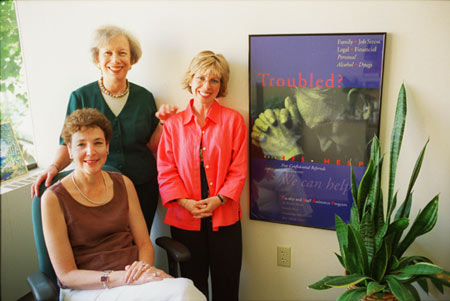Mental health workers prepare for Sept 11th ‘reaction’

Mental health professionals call it the anniversary reaction – the triggering of negative feelings as the date of a past traumatic event makes its annual appearance on the calendar.
It may be the death of a loved one, an accident, a violent encounter, a financial or business reversal, or any of the myriad ways in which our sense of stability and security can be shaken to the core.
In most cases these events are private, personal. But next month, one date will be highlighted on everyone’s calendar as the anniversary of a trauma that was nationwide, if not worldwide: Sept. 11.
As that date approaches, and as footage of the collapsing World Trade Center towers and the shattered Pentagon appear repeatedly on television screens, people are bound to re-experience feelings that may have been buried or obscured during the intervening months, often to a degree they had not anticipated.
Getting ready for this somber anniversary and finding ways to help Harvard employees through it has been an important goal of the Faculty and Staff Assistance Program (FSAP).
“It’s impossible for people to anticipate how they’re going to feel,” said clinician Andrea Grant, LICSW. “We want to remind them they’re just members of the human race and are responding the way people do. They’re not having an abnormal reaction – they’re having a normal reaction to abnormal circumstances.”
To help people anticipate, understand, and manage the range of responses that this anniversary will generate, FSAP will conduct a series of lunchtime seminars. The Cambridge event will take place Wednesday (Sept. 4), from noon to 1 p.m., in the Lehman Hall Common Room in Dudley House, second floor. For the Longwood campus, the seminar will take place Thursday (Sept. 5), noon-1 p.m., in Countway Library, fifth floor.
The event will feature a talk by clinician Nancy Costikyan, LICSW, titled “Ordinary People, Extraordinary Times: Remembering September 11.” The event is free and open to the public, but seating is limited, so please call (617) 495-4357 to register.
Although the inevitable media blitz around the anniversary may be upsetting to people, Costikyan believes that the reappearance of these frightening images may have a positive influence as well.
“The anniversary of any major life event, negative or positive, becomes an opportunity to further integrate it into the narrative of the community. It takes time to put it in a place where we can understand it,” she said.
Of course, it is true that the specific way in which a person was affected by Sept. 11 may have a bearing on the emotional impact the event had and will continue to have, Costikyan said. Some people may have had friends or relatives who were victims of the attacks, others may have gotten involved as volunteers, others may have no more direct involvement than as spectators. But the degree of involvement does not always correspond with the emotional consequences.
“Some people may find themselves wondering, why am I feeling so awful about this? I wasn’t there. But people have very idiosyncratic reactions to things like this,” Costikyan said.
“People have different levels of vulnerability,” added Grant. “People who have had losses in the past may be especially deeply affected. Any loss triggers feelings about previous losses. But even for people who haven’t had personal losses, 9/11 may have just blown their fantasy about being safe and secure right out of the water.”
Others may be experiencing what Costikyan calls “emotional procrastination,” a tendency to suppress or put off feelings connected with the event. In many cases, those feelings may return in full force later on, just as one thought them safely under control.
“People have different timelines. Some may have been angry or traumatized, but they managed to hold it together, to be a rock for everyone else. Then, later on, they may find themselves falling apart. Others may be what we call ‘resilient.’ They may have been less affected by the traumatic event than those around them, or are able to bounce back more quickly. The point we want to make is that the range of ‘normal’ is really quite broad at an unusual time like this.”
In addition to the lunchtime seminar on Sept. 4 and 5, additional tips for dealing with the emotional impact of Sept. 11 can be found on the FSAP Web site at http://www.fsap.harvard.edu/. Harvard faculty and staff can also contact FSAP at (617) 495-4357 for a confidential consultation.




